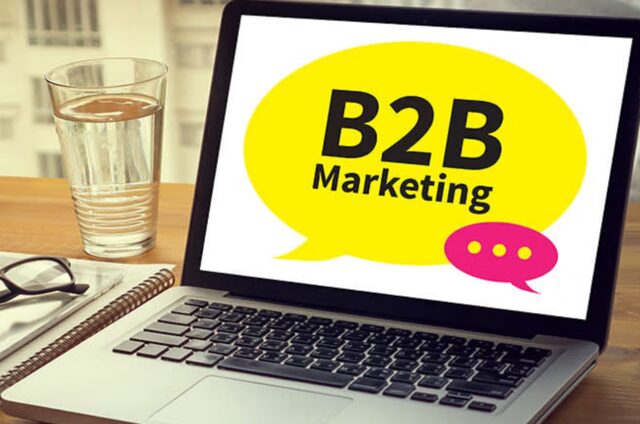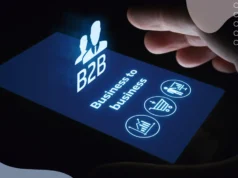
The digital imperative has become clear for B2B marketing in today’s rapidly evolving business landscape. The shift from traditional methods to digital strategies is no longer just an option; it’s necessary. This article delves into the multifaceted aspects of B2B marketing’s digital transformation, exploring its imperative influence on buyer journeys, data-driven decision-making, automation, AI, and content strategy.
The Digital Imperative in B2B Marketing
The B2B landscape is undergoing a seismic shift, demanding a swift digital transformation. With traditional methods losing relevance, businesses must embrace digital strategies to engage modern buyer persona development effectively.

Understanding the Urgency of Digital Transformation in B2B
The urgency of digital transformation in B2B marketing arises from the changing dynamics of the business world. As buyers become more digitally adept, b2b marketing agency must keep pace. A digital-first approach enables businesses to engage potential clients where they spend most of their time – online.
From Traditional to Digital: The Shift in B2B Customer Behavior
The shift in B2B customer behaviour towards digital platforms is profound. Research shows that B2B buyers conduct extensive online research before engaging with a sales representative. This digital prelude demands that businesses create a strong online presence to capture potential leads and guide them through the buyer’s journey.
Digital Disruption and its Impact on B2B Marketing Strategies
Digital disruption has upended traditional B2B marketing strategies. Account-based marketing, lead generation, branding and positioning, and positioning have all been redefined digitally. Agencies and fractional CMOs offering B2B marketing services must be equipped to adapt strategies to navigate this new landscape effectively.

Adapting to Changing B2B Buyer Journeys
The journey of B2B buyers has evolved significantly due to digital transformation. Navigating this intricate path requires a deep understanding of the new touchpoints and interactions that define their decision-making process. This section delves into mapping these digital journeys, adopting an omnichannel approach, and leveraging digital tools to address the unique pain points of B2B buyers effectively.
Mapping the Digital B2B Buyer’s Journey: Touchpoints and Interactions
The digital buyer’s journey is a complex web of touchpoints and interactions. Prospects engage through websites, social media, emails, webinars, and more. A comprehensive understanding of these interactions is essential to tailor strategies that guide buyers seamlessly through their decision-making process.
Omnichannel Approach: Creating Seamless Experiences Across Channels
Adopting an omnichannel approach is crucial. It ensures a consistent and integrated experience across various platforms. Seamless navigation between channels fosters trust and engagement, leading to better conversion rates.
Leveraging Digital to Address B2B Buyers’ Unique Pain Points
Digital transformation provides a unique opportunity to effectively address B2B buyers’ pain points. Content that addresses specific challenges and offers valuable insights positions businesses as trusted advisors. Such content can be disseminated through blogs, eBooks, webinars, and other digital mediums.

Data-Driven Decision-Making in B2B Marketing
In the age of digital transformation, data has emerged as the guiding light for B2B marketers. Leveraging data analytics and measurement offers insights into buyer behaviours and preferences and empowers marketers to make informed strategic choices. This section delves into the power of harnessing data, establishing a data-driven culture, and utilizing insights for personalized and impactful campaigns.
Harnessing Data Analytics for Informed B2B Marketing Strategies
Data analytics is the backbone of digital B2B marketing technology. Insights derived from data reveal buyer behaviours, preferences, and trends. These insights drive informed decisions, leading to more targeted and effective campaigns.
Building a Data-Driven Culture: Key Steps and Challenges
Creating a data-driven culture is pivotal. It requires aligning teams, investing in training, and establishing data collection and analysis processes. Overcoming privacy concerns and data silos is essential for a successful transformation.
Personalization through Insights: Tailoring B2B Campaigns with Data
Data empowers personalization, a cornerstone of effective B2B marketing. Tailoring campaigns based on buyer personas, competitive analysis, and historical data enhances relevance and resonates with the target audience.

Automation and AI in B2B Marketing Operations
Automation and AI have become integral to modern marketing, streamlining processes and enhancing efficiency. As digital transformation accelerates, these technologies are pivotal in analyzing data, optimizing campaigns, and balancing automated interactions and the human touch. This section explores the fusion of automation and AI, their role in refining B2B operations, and the art of creating personalized customer experiences in the digital realm.
Streamlining B2B Processes with Marketing Automation
Marketing automation optimizes workflows, from lead generation to nurturing and conversion. It reduces manual tasks, allowing teams to focus on high-value activities and creative strategies.
AI-Powered Insights: Enhancing B2B Campaign Efficiency and Effectiveness
AI augments B2B marketing by analyzing vast datasets, identifying patterns, and predicting outcomes. These insights enable marketers to refine strategies and improve campaign efficiency.
Balancing Automation with Human Touch in B2B Customer Interactions
While automation enhances efficiency, maintaining a human touch is crucial for meaningful customer interactions. A balanced approach ensures that automation complements, rather than replaces, human engagement.

Content Strategy in the Digital B2B Landscape
In the digital landscape of B2B marketing, crafting a robust content marketing strategy is paramount. It’s not just about creating content; it’s about creating value-driven content that resonates with your audience. This section delves into crafting digital-first content, optimizing it for search engines, and effectively distributing it through various digital channels to establish thought leadership and engage B2B buyers.
Crafting Digital-First Content: Blogs, eBooks, Webinars, and Beyond
Content marketing remains pivotal in the digital B2B landscape. Creating value-driven content in various formats – blogs, eBooks, webinars – establishes authority and nurtures leads.
SEO and Content Optimization: Strategies for B2B Online Visibility
Search engine optimization (SEO) ensures that content reaches the right audience. Businesses can improve online visibility and attract organic traffic by optimizing content for relevant keywords and search intent.

Content Distribution in a Digital World: Social, Email, and Beyond
Content distribution is as important as its creation. Leveraging social media marketing and email campaigns expands reach. Sharing valuable insights positions businesses as industry thought leaders.
In conclusion, the digital transformation of marketing is not a choice; it’s a strategic imperative. By understanding the urgency of this shift, adapting to changing buyer journeys, harnessing the power of data, embracing automation and AI, and crafting a comprehensive content strategy, B2B businesses can navigate the new landscape successfully. This transformation encompasses agency services, marketing strategies, lead generation, content marketing, digital marketing, account-based marketing, marketing automation, social media marketing, sales enablement, branding and positioning, analytics and measurement, buyer persona development, competitive analysis, and marketing technology. As the digital realm continues to evolve, businesses that embrace these changes will be well-positioned to thrive in the competitive marketplace.









